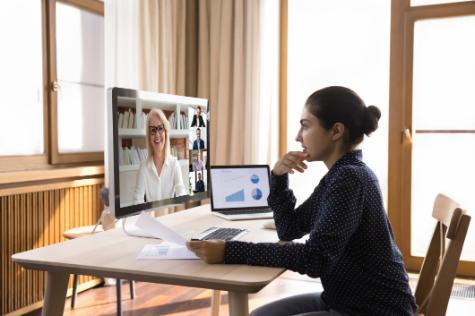Virtual Residency Interview Format Offers Both Benefits and Challenges
COVID-19 Pandemic Disrupted Residency Recruitment With Traditional In-person Interviews Changed To Virtual Format

Residency recruitment was one of many areas disrupted during the COVID-19 pandemic, with traditional in-person interviews forced to change to a virtual format. In a nationwide study of fourth-year medical students, recently published in Family Medicine, New York Medical College faculty and students found that while the change in format offered financial and time-saving benefits due to the lack of need for travel, it proved challenging for students to assess their fit into the program. An earlier survey of residency program directors (PD) published in Academic Medicine, reported similar findings with the benefit of convenience but the difficulty of gauging an applicant’s fit or genuine interest through a virtual format.
“We thought it was critical to share both perspectives—the students and the program directors—from the match,” said Lior Levy, SOM Class of 2023. “With the abrupt transition of the virtual residency application process, many factors were affected, and this research is critical to inform how the future of higher education interviews will evolve.”
“In previous match cycles, qualified applicants were offered in-person interviews at prospective residency programs in a structured process that allowed applicants an opportunity to visit program sites, interact with program faculty and socialize with the current residents,” said Jane Ponterio, M.D., senior associate dean for student affairs and associate professor of obstetrics and gynecology. “Likewise, program directors and faculty were able to use that in-person time to assess the applicants’ professionalism, interpersonal skills and overall fit for the program.”
The study administered to fourth-year medical students currently participating in the residency match using Survey Monkey found that while most respondents thought they were able to confidently represent themselves to the program using a virtual platform, only a small number thought they could confidently assess a program’s facility virtually. Less than half confidently believed they could assess their fit into the program after the conclusion of the virtual interview.
“Most respondents in the student survey appreciated the time saved from traveling, as well as the comfort of being able to interview from a familiar setting,” said Levy. “In addition, the virtual format afforded more flexibility, including the ability to schedule multiple interviews in one day, being able to do West Coast and East Coast interviews back-to-back and fewer interruptions in clinical rotations. However, students reported that they found it difficult to present themselves virtually, assess program facilities and location or get a feel of the program’s culture, camaraderie or vibe, which would allow them to determine their fit in the prospective residency programs.”
In the residency program director survey, PDs found it challenging to confidently assess applicants’ interpersonal skills, professionalism and fit for the program remotely. Many PDs cited as a limiting factor not being able to observe the “small talk,” body language and interpersonal interactions with staff and residents in between interviews and during in-person social events, with virtual meet-and-greets not making up for this deficit. As a result, the study found a portion of PDs relied more heavily on tangible factors when ranking applicants during the 2020–2021 Match cycle compared with previous years, including performance evaluations and test scores.
Respondents offered several suggestions for improvement that could prove helpful to program directors, applicants and medical school administrators going forward, including shorter interviews, more engaging resident-led virtual social hours without faculty present that relied less on questions and answers and more on fun activities and pre-interview packages to include video representations of the program facilities and frequently asked questions that could be reviewed on the applicants own time rather than doing the interview.
